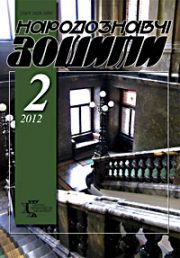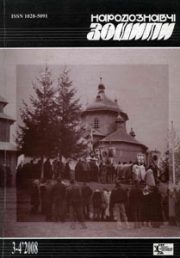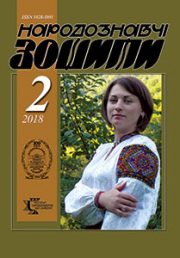The Ethnology Notebooks. 2024. № 1 (175), 56—69
UDK 77.064:[069.5:061.2(477.83-25)НТШ]
DOI https://doi.org/10.15407/nz2024.01.056
TARAS Yaroslav
- ORCID ID : https://orcid.org/0000-0001-7241-9466
- Doctor of Historical Sciences, Professor,
- Institute of Ethnology of the National Academy of Sciences of Ukraine,
- Head of the modern ethnology department,
- 15, Svobody Avenue, 79000, Lviv, Ukraine,
- Lviv Polytechnic National University,
- Department of Architecture and Conservation, Professor,
- 12, Bandery street, 79013, Lviv, Ukraine,
- Contacts: e-mail: etnomod@ukr.net
Abstract. In this article the collection of photo negatives is considered, which is kept in the archive of the Ethnology Institute. This collection is a unique multifaceted source for the study of microhistory due to its informativeness.
The purpose of the article is: publication of information about photo negatives collected by the Museum of NTSH, showing how scientists at the beginning of the 20th century mastered the profession of photographer, and photography became a new tool for recording the phenomenon they were studying. Negatives have significant national and cultural interest and considerable value for the future.
The object is: negatives collected by the Museum of NTSH, which are stored in the archives of the Ethnology Institute of the National Academy of Sciences of Ukraine.
The subject is: the photographic practices of scientists of NTSH in preserving the visual memory about the ethnic identity of individual ethnographic and ethnic groups and the natural features of Galicia.
It was found out that the most part of negatives in the funds of the Ethnology Institute of the National Academy of Sciences of Ukraine were preserved from F. Vovk, V. Shcherbakivsky, Ya. Pasternak, O. Prusevych, Ya. Falkovsky, V. Grebenyak, G. Smolsky, Ya. Bereza, M. Yermolaiv.
It was defined that there were two time periods of photofixation of material culture by the Museum of NTSH. The first period lasted until the First World War. At that time, prominent scientists of that time F. Vovk, V. Shcherbakivsky, O. Vahnyanyn, V. Grebenyak, Ya. Pasternak recorded material culture on photographic plates. The second period lasted from the end of the 1920s to 1940, it was connected with the tenure of the director of the Museum of NTSH, Ya. Pasternak (1929—1939), with young members of the Ethnographic Commission and employees of the Museum of NTSH.
Keywords: ethnology, architecture, Museum of NTSH, photography, photographic negatives, scientists of NTSH, F. Vovk, V. Shcherbakivsky, Ya. Pasternak.
Received 24.06.2023
REFERENCES
- V. Stefanyk National Scientific Library of Ukraine in Lviv. Department of manuscripts. Fund 4 (NTSH Library). Description 603/4. Case 1. Sheet 113—114 [in Ukrainian].
- Banakh, V. (2017). NTSH Museum in Lviv (1912—1939): Scientific-Fund Work. Historical and Cultural Studies, 1 (Issue 4, pp. 21—26) [in Ukrainian].
- Rakovsky, I. (1925). Reflections by F. Vovk on the racial characteristics of the Ukrainian people. Collection of the Mathematical-Naturalistic-Medical Section of NTSH (Vol. XXIII—XXIV, pp. 183—200). Lviv: Shevchenko scientific society [in Ukrainian].
- Central State Historical Archive of Ukraine in Lviv. Fund 309. Description 1. Case 42. sheet 33 [in Ukrainian].
- Taran, O. (2003). Scientific and practical activity of F. Vovk in the field of Ukrainian anthropology. The Ukrainian Museum. Сollection of scientific articles. Kyiv [in Ukrainian].
- Central State Historical Archive of Ukraine in Lviv. Fund 309 (Shevchenko Scientific Society). Description 1. Case 4. Sheet 10 [in Ukrainian].
- (1903). Report on the anthropometric excursions of Dr. Fedir Vovk. Chronicle of the Shevchenko scientific society in Lviv, 16 (Issue 6, pp. 13—14) [in Ukrainian].
- Havryliuk, Yu. Fedir Vovk — researcher of the «Ukrainian-Ruthenian Carpathians». Nashe-slowo, 19. 2019-05-12. Retrieved from:https://nasze-slowo.pl/fedir-vovk-doslidnik-ukra-nsko-ruskih-karpat/ (Last accessed: 14.06.2023) [in Ukrainian].
- (1922). Scientific activity of the society. Chronicle of the Shevchenko scientific society in Lviv, 65—66 (Issue I—II) [in Ukrainian].
- Vovk, F. (1908). Anthropometric research on the Ukrainian population of Galicia, Bukovina and Hungary. Materials for Ukrainian-Ruthenian Ethnology: in 22 vol. (Vol. 10, pp. 1—39). Lviv: NTSh [in Ukrainian].
- Mykhailo Markovych. Facebook post. Retrieved from: https://www.facebook.com/photo/?fbid=3406080439637488&set=a.1439551799623705 (Last accessed: 14.06.2023) [in Ukrainian].
- Kotsiubynsky, M. The Ambassador from the Black Tsar. Retrieved from: https://www.ukrlib.com.ua/books/printit.php? tid=2545 (Last accessed: 14.06.2023) [in Ukrainian].
- (1904). Report on the anthropological expedition of Dr. Fedir Vovk. Chronicle of the Shevchenko scientific society in Lviv, 20 (Issue 4) [in Ukrainian].






